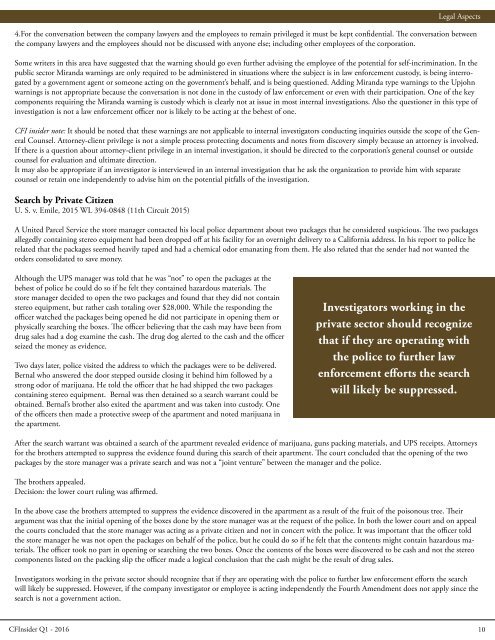A Non-Verbal Response from a Professional Politician
4n42WM
4n42WM
Create successful ePaper yourself
Turn your PDF publications into a flip-book with our unique Google optimized e-Paper software.
Legal Aspects<br />
4.For the conversation between the company lawyers and the employees to remain privileged it must be kept confidential. The conversation between<br />
the company lawyers and the employees should not be discussed with anyone else; including other employees of the corporation.<br />
Some writers in this area have suggested that the warning should go even further advising the employee of the potential for self-incrimination. In the<br />
public sector Miranda warnings are only required to be administered in situations where the subject is in law enforcement custody, is being interrogated<br />
by a government agent or someone acting on the government’s behalf, and is being questioned. Adding Miranda type warnings to the Upjohn<br />
warnings is not appropriate because the conversation is not done in the custody of law enforcement or even with their participation. One of the key<br />
components requiring the Miranda warning is custody which is clearly not at issue in most internal investigations. Also the questioner in this type of<br />
investigation is not a law enforcement officer nor is likely to be acting at the behest of one.<br />
CFI insider note: It should be noted that these warnings are not applicable to internal investigators conducting inquiries outside the scope of the General<br />
Counsel. Attorney-client privilege is not a simple process protecting documents and notes <strong>from</strong> discovery simply because an attorney is involved.<br />
If there is a question about attorney-client privilege in an internal investigation, it should be directed to the corporation’s general counsel or outside<br />
counsel for evaluation and ultimate direction.<br />
It may also be appropriate if an investigator is interviewed in an internal investigation that he ask the organization to provide him with separate<br />
counsel or retain one independently to advise him on the potential pitfalls of the investigation.<br />
Search by Private Citizen<br />
U. S. v. Emile, 2015 WL 394-0848 (11th Circuit 2015)<br />
A United Parcel Service the store manager contacted his local police department about two packages that he considered suspicious. The two packages<br />
allegedly containing stereo equipment had been dropped off at his facility for an overnight delivery to a California address. In his report to police he<br />
related that the packages seemed heavily taped and had a chemical odor emanating <strong>from</strong> them. He also related that the sender had not wanted the<br />
orders consolidated to save money.<br />
Although the UPS manager was told that he was “not” to open the packages at the<br />
behest of police he could do so if he felt they contained hazardous materials. The<br />
store manager decided to open the two packages and found that they did not contain<br />
stereo equipment, but rather cash totaling over $28,000. While the responding the<br />
officer watched the packages being opened he did not participate in opening them or<br />
physically searching the boxes. The officer believing that the cash may have been <strong>from</strong><br />
drug sales had a dog examine the cash. The drug dog alerted to the cash and the officer<br />
seized the money as evidence.<br />
Two days later, police visited the address to which the packages were to be delivered.<br />
Bernal who answered the door stepped outside closing it behind him followed by a<br />
strong odor of marijuana. He told the officer that he had shipped the two packages<br />
containing stereo equipment. Bernal was then detained so a search warrant could be<br />
obtained. Bernal’s brother also exited the apartment and was taken into custody. One<br />
of the officers then made a protective sweep of the apartment and noted marijuana in<br />
the apartment.<br />
Investigators working in the<br />
private sector should recognize<br />
that if they are operating with<br />
the police to further law<br />
enforcement efforts the search<br />
will likely be suppressed.<br />
After the search warrant was obtained a search of the apartment revealed evidence of marijuana, guns packing materials, and UPS receipts. Attorneys<br />
for the brothers attempted to suppress the evidence found during this search of their apartment. The court concluded that the opening of the two<br />
packages by the store manager was a private search and was not a “joint venture” between the manager and the police.<br />
The brothers appealed.<br />
Decision: the lower court ruling was affirmed.<br />
In the above case the brothers attempted to suppress the evidence discovered in the apartment as a result of the fruit of the poisonous tree. Their<br />
argument was that the initial opening of the boxes done by the store manager was at the request of the police. In both the lower court and on appeal<br />
the courts concluded that the store manager was acting as a private citizen and not in concert with the police. It was important that the officer told<br />
the store manager he was not open the packages on behalf of the police, but he could do so if he felt that the contents might contain hazardous materials.<br />
The officer took no part in opening or searching the two boxes. Once the contents of the boxes were discovered to be cash and not the stereo<br />
components listed on the packing slip the officer made a logical conclusion that the cash might be the result of drug sales.<br />
Investigators working in the private sector should recognize that if they are operating with the police to further law enforcement efforts the search<br />
will likely be suppressed. However, if the company investigator or employee is acting independently the Fourth Amendment does not apply since the<br />
search is not a government action.<br />
CFInsider Q1 - 2016<br />
10


